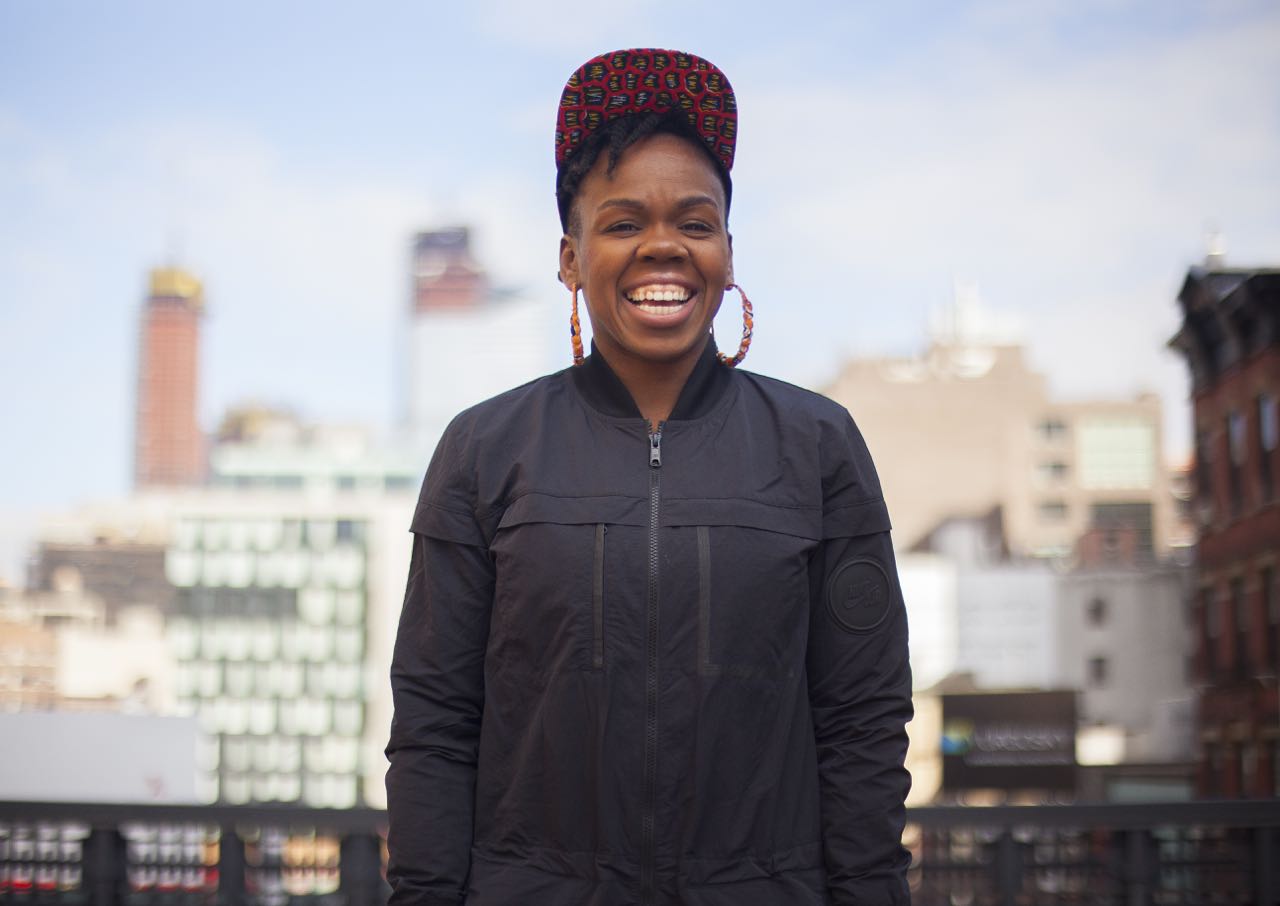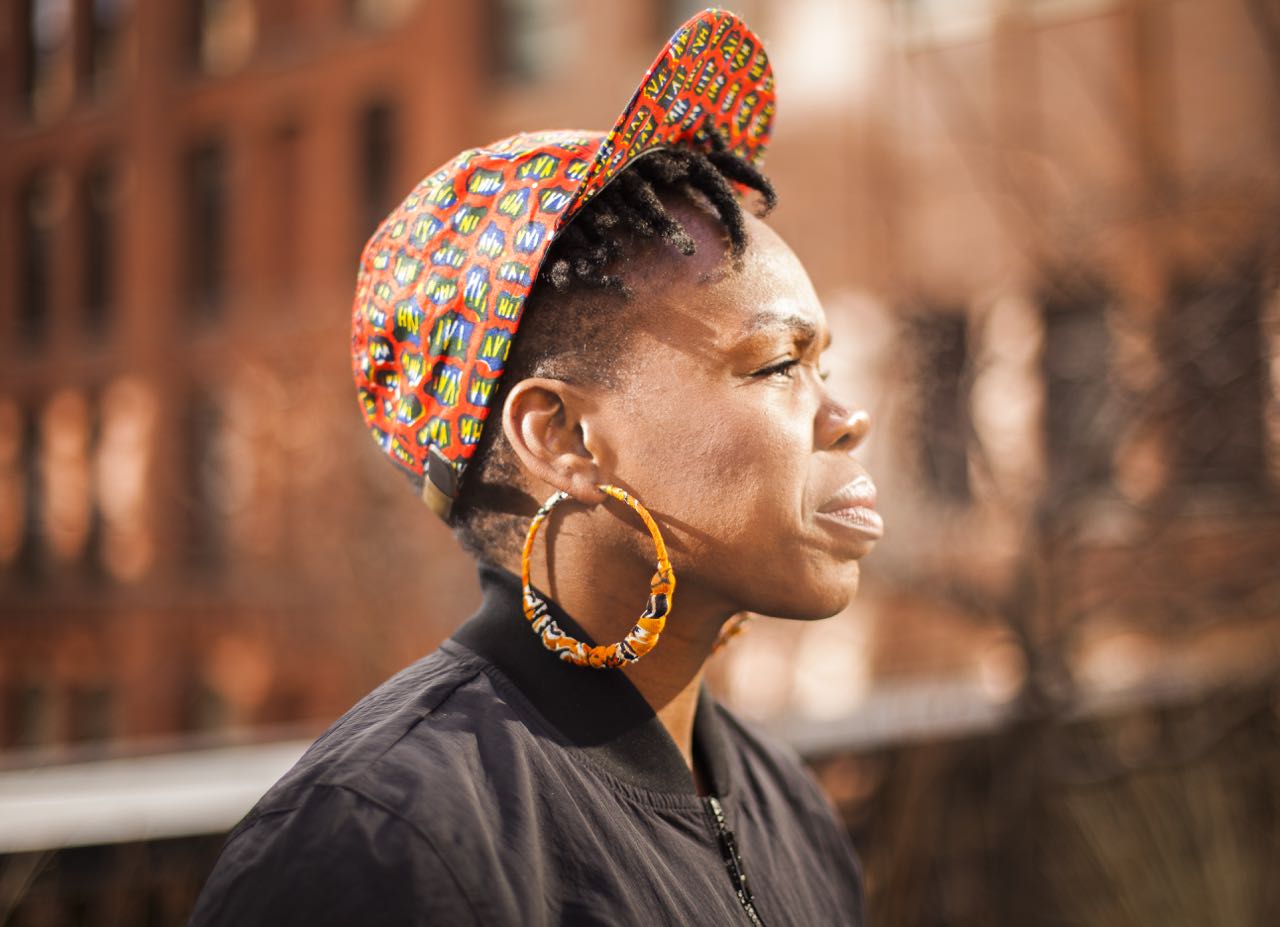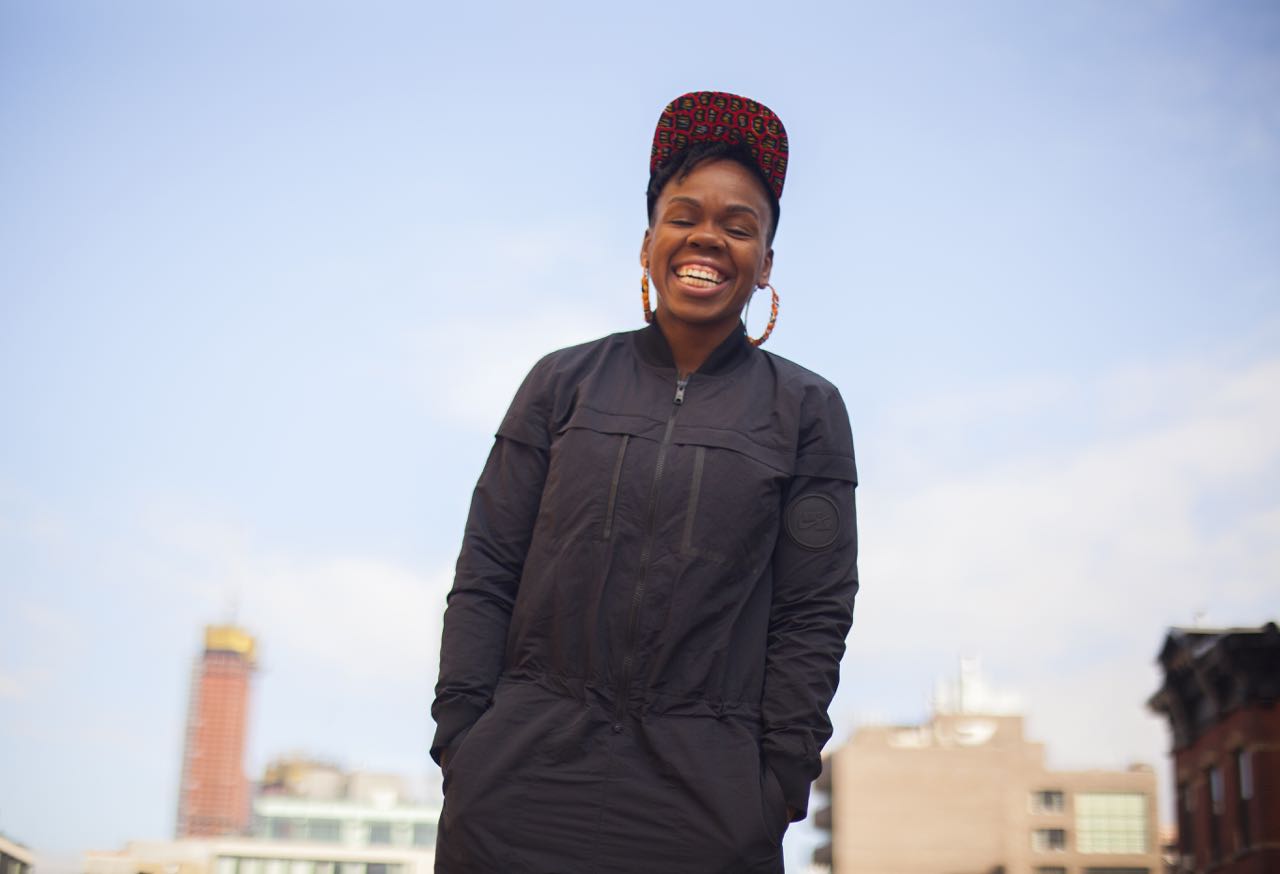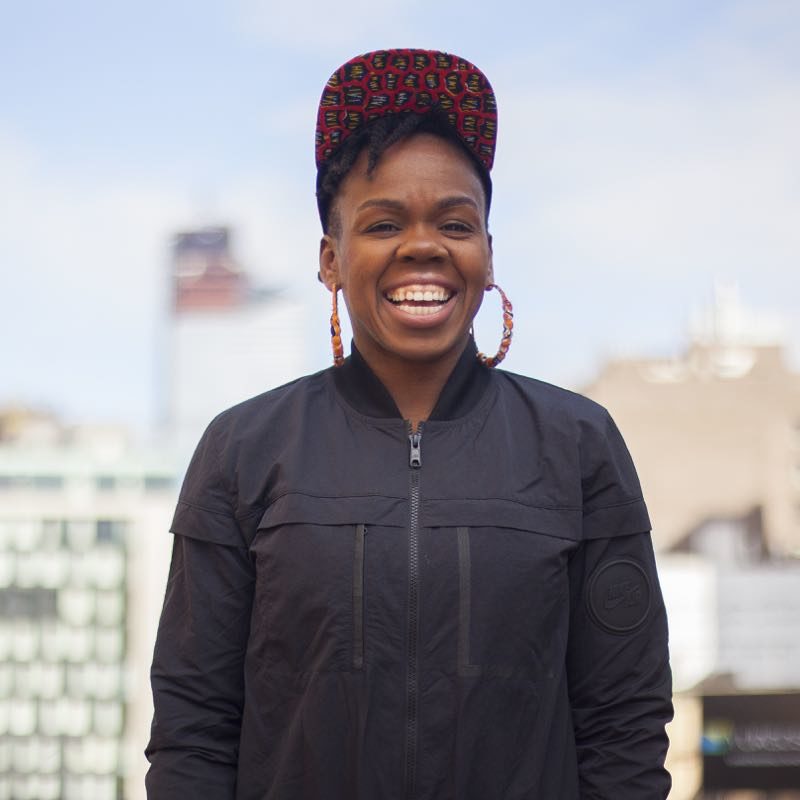Ngozi Anyanwu on “The Homecoming Queen”

Written by Victoria Myers
Photography by Marisa Chafetz
January 22nd, 2018
The new play The Homecoming Queen by Ngozi Anyanwu and directed by Awoye Timpo tells the story of a novelist, Kelechi, who returns home to Nigeria to care for her elderly father. Kelechi left the country after a traumatic event in her youth and her return forces her to examine her past after a decade away from the place she was raised. The Homecoming Queen, which is currently playing at Atlantic Theater Company, marks Ngozi’s Off-Broadway playwriting debut. Her previous plays include Good Grief and she has worked extensively as an actor. We recently spoke with her about her inspiration for the play and how current events changed it, her writing process, and balancing both acting and writing.
What was your inspiration for the play?
One of the main inspirations was when my dad went to Nigeria to go bury his father after about 15 years. He hadn’t done a formal burial. I started to wonder what it would be like to have to go back. My parents and I have very realistic conversations—they’re at that age now—about what it is that they want when they pass. As someone who’s first generation, I was like, “What is that,” to have to go back to a culture that I’m connected to, but I’m not bilingual. I’m just connected from my parents who are Nigerian and Igbo, and to be close to my culture but not of the culture. This play sprung out of that, out of this connection, but it’s connecting to my culture.
When you actually sat down to write, did you feel like you completely understood what the play was, or was it really an exploration to figure out the themes?
At first it was a revenge play, and at first it was almost an adaptation of The Visit. What it is to be a prodigal daughter of your town, of where you come from, but actually to have more negative memories than you do positive of that town? That was the original thought of it. For me, it was like I thought I knew what the play was, and then it became something else. It was just writing and sifting through and sifting through and making a first pass at it, and then being like, this play is not what I thought it was at all.
Originally, I wanted to write a play about trauma and complicity and revenge, along with the trauma of actually being disconnected and equating that with physical trauma. But a love play just kept coming out, and a play about distance and a play about healing kept coming out. As I kept working on the play in different workshops and the world that we are living in kept changing, I was like, “Oh, actually this sort of revenge play is not needed. A play about healing is needed.” I became more curious about how does this character, or how do these people, take the first steps towards healing each other as opposed to tearing each other down and getting back at each other? The more I paid attention to what was going on in the world, the more I thought we actually need this. If we’re going to be putting plays out into the world, and if we’re going to be putting things out into the world, this is what we need. I can tell that very dark, deep story that will leave you feeling terrible and uncomfortable and like you need to take a shower after, or I can tell this story of how maybe it’s time for us to crack our hearts open a little bit and be vulnerable a little bit, and I decided to do that.
Did you have any resistance to changing your initial impulse because of the changing times?
There was always resistance towards it. I don’t want to give away the play, but things that are obviously going on now in the world as far as being a woman in this world, there’s resistance towards certain things I have in my characters and the men in my characters, and though I want them to be complicit in the patriarchy, I also have to really honestly talk about how at the end of the day we’re all suffering from trauma, and that matters, and what would happen if we could hear each other? And though this is the woman’s time, we as human beings—period—need to hear each other’s trauma. There is a resistance to me as a woman that is, “No, dudes, you need to sit back and be quiet.” Then there’s the other part of me that is, “Oh, but that is not going to get either of us healing. That’s not going to get us where we need to go, so we need to actually sit and be quiet for each other.”
I don’t know how to do that yet in my life, so it’s hard for me to do it in the play. It’s hard to ask these actors to push themselves in a way, as human beings, to understand these people when they would not do that, and push them forward in their humanity. It’s been a difficult process in a beautiful way.
For the character of Kelechi, did you ever feel that there was pressure, either internal or external, to make her more likable or more this or more that? All that baggage that comes with writing female characters.
I don’t think about that stuff. I think she’s a closed-off woman that learns how to become open. I did worry about her being perceived as the bitch, but I can’t control how other people perceive her, and quite frankly, this play is an exploration of the bitch.
It’s an exploration of that woman that you don’t know that’s kind of hard, that’s kind of aggressive, that is kind of unlikeable, and the things that that person may or may not have been through that got them that way. We all start open, and things happen to us that close us off. For me, it was actually an exploration of that unlikeable woman.
So no, I’m not worried about that. I don’t think Mfoniso Udofia, who’s playing the lead character, is worried about that. We’re just worried about the honesty of this person. I did worry about the actors who would be playing her that they would judge her and just play up the bitch stuff, but no, this is just how she navigates the world. She’s tough, and she doesn’t take any shit, and she’s been hurt like all of us. Some of us will take it in stride, and some of us will not. But for me, it was very much an exploration of what you know as the hard, black woman. Not where all of it comes from, but where it comes from in Kelechi.
Not to give anything away, but did it take you a while to figure out what her trauma is and what the inciting incident of that would be, or did you know early on?
I think I always knew. Even though it’s not really fully mentioned in the play, I had to figure out the details of that. And it’s also up to the actors to get the details of that trauma and build it for themselves because it’s not said in the play. It’s only inferred. You can really make it up for yourself what and how it happened. The director and me and the actors talked through what we thought the actual inciting incident is and the details of that inciting incident. We made it really specific for the four of us, and then once we did that we were able to progress with that.

What are your influences in terms of language?
For this one the influence is Pinter, because the influence was how you say things that are not said. I feel like that’s specifically what he does. Also, my culture is very much the influence of that because we’re good at being angry and passionate and what have you, but when it comes to the very vulnerable stuff, we’re not very good at that. We’re not very good at like, “You hurt me,” or, “When you said this, this really hurt my feelings,” or, “This really bad thing happened to me and I want to talk about it.” My parents don’t mention the things that they’ve been through in Nigeria. They only mention it just kind of randomly. That was probably my biggest influence when it came to this play. The play kind of unfolds itself as a sort of mystery play. I don’t necessarily have any specific influences on that, but for me it was all about peeling off the layers where you get new information. But Pinter was a big thing because it was all about short sentences. I really didn’t want to have any long monologues besides what the papa says at the end. It was like one sentence and you would get it. Two words and you would get what happened, which was painful for the actors to go through because I wouldn’t give them the full sentence to discover. They really had to just fill in two words. They would have to do everything.
When you’re writing, do you see the play as a play or do you see it as real events unfolding in your mind in real time?
I think I see it as real events unfolding. I’m walking through the scenes in my mind and in my heart as I’m writing it. I’m getting up and talking to myself. I record a lot of the scenes before I put it down on paper. I’m walking through the whole play exactly how it goes, exactly how he places her hand and her shoulder, and exactly how the father is going to say this line. I, of course, as a playwright, don’t tell them how to do any of those things, but I’m walking and dreaming and walking through the play in its entirety and talking, and maybe doing a monologue or a scene to myself on my iPhone and talking about it, and then transcribing that.
Can you talk a little bit more about your actual physical process of writing?
My technique right now is still fragmented, which I don’t think I’m going to be able to get away with for much longer because of business. But literally, at like two o’clock in the morning something will come to me and I will just talk into my phone and hope that they got it, and then I’ll come back to it. I’m also sometimes inspired while I’m reading something and I’m like, “Oh fuck. Oh, you can write something like that? You can write in that structure?” And then I’ll literally just make sure I type some stuff on my iPad because I can’t break out my laptop on the subway. I write on the subway. I have a residency at Lincoln Center for LCT3 right now, so I also sometimes sit there and write.
I do a lot of my rewrites on my laptop and just put it all there and then connect to things. That’s probably why my plays tend to be fragmented in the first couple of drafts because it’s a lot of stuff just hodge-podged together. And then, when the actors come in the room, they call you out and they go, “This is not connecting.” And then when we workshop it and you bring in actors, for better or worse, they’re really great about being like, “No. Yes. Yes. No.” And you get to pick and choose which [suggestions] you dig.
Since you’re an actor as well, how have you found the balance between writing and acting? Both in the sense of your life as a person and an artist, but also, have you had issues with getting other people to take you seriously doing both things?
I have not yet found the balance. I am late on a very important deadline by about two months, and I start rehearsal for a new play in February as an actor. And I’m going on my first vacation ever at the end of this. And I have to go to Sundance for a project. There’s lots happening. I’m spinning a lot of plates. Some of them have broken. That’s just the nature of being a busy person.
I’m working on how to find the balance. And I am a procrastinator. That’s my biggest talent. I’m working in this now adult phase of my multi-hyphenate life to actually figure out how to balance being an actor, writer, producer, director, everything creator. I’m trying to figure out, “Okay, right now this is more worth it and I need to work on this.” I’m working on a play, and so that TV thing is going to be behind, and hopefully they don’t fire me. That’s what I’m going to go work on after this interview.
As far as being taken seriously, it is not easy to be an actor/performer, but you just have to decide that that’s what you are, and you have to just tell people what you are, and you have to be good at both things. And you have to love both things. There are some people who are good at both things, but they don’t love both things. For me, I like writing, but it’s torturous for me, and I love acting. But right now, I’m a more successful writer. For me, I’m balancing that out, and a lot of times I write what I perform. I’m good as far as the happy/love quotient. What keeps me balanced in the moment, while I work on Homecoming Queen, is that I know I’m going to be acting in something in a month and a half. That part of me that I really need to get out is being fulfilled, and people take me seriously in it because I don’t let them not take me seriously in it. And some people don’t. I’m not a coveted actor. I’ve still got to audition. I’ve still got to work my ass off to be in a play as an actor, which I’m fine with. But at the moment, I’m a coveted writer. People are like, “Hey, can I get your next play? I’m interested.”
But I take myself very seriously. I’ve always believed the people who are going to take me seriously are going to. Since writing, I’ve done more acting workshops and acted more because I’ve created stuff for myself, and I have people asking me to do their readings and workshops now even though I’m a writer and they actually still haven’t seen me as an actor. I do think that creating things and making things has actually opened up more avenues for me.
What do you think the theatre community could do to make it easier for people who are interested in doing multiple things?
Let them. That’s really what it comes down to. For writer/performers, make better things, because sometimes people are not great at both, and you have to really create something that is so solid and you have to make it hard for people to say no to you, and you have to show them. That may not mean that you get to be at Lincoln Center starring in and writing your own play. It may mean you have to be at a 60 seat black box starring in and doing your own play first, and you show them. And that’s sort of how I started. I just put on my first play myself and produced it myself. I think it’s twofold. The artists have to make the thing themselves. They have to make it and just put it out there in any way that you can, the cheapest way that you can. The institutions just have to let them do their work. And be okay to have something that just completely fails that doesn’t have famous people in it. We need to create more spaces for failure, because sometimes watching failure is glorious, but we’re sort of creating spaces just for safety or creating spaces for mediocrity, and that’s boring.
How do you think the new play development system could be improved?
More, different stories by untrained writers. And more things on their feet. You can develop something at the table forever. You can develop something at a music stand forever. But a playwright is not going to really, really know how something works until it gets on its feet. So, more things that are about getting something on its feet. More things like these labs were you’re like, “Actually, I don’t need an amazing set,” but more working with designers and the other creators that make your play.
There is a thought that the playwright is God, which I’m down with, obviously, because I’m a playwright. But there are designers who also have been dreaming about your play as much as the actors and the director have, and what would it be to have a lab where you can actually see something on its feet? I think more development centers should be working towards a ground floor type of thing. That feels better to me, even if it falls completely apart. I think development that is more forward-moving so that you can actually get a better look at the piece that you’re making [would be helpful].
You also mentioned more untrained voices.
Structurally, there is this thing that is happening that it’s like everyone’s kind of writing the same. You see a play, people see a bunch of plays, or you go to whatever great writing place and you think, this is what a play is supposed to look like. And what is more interesting to me are the voices that don’t know what a play is supposed to look like, but just have an honest story to tell. They’ve got a really good story. As someone who’s over-trained in the theatre, I am very interested in storytellers that don’t know what a play is supposed to be, that have no idea, but have a really dope story to tell inside them. That is, to me, more provocative and probably going to get us more interesting theatre.

Going back to The Homecoming Queen, what do you hope audiences take away from it?
That we’re all going through the same shit. We’re all in pain, and hopefully healing is possible and it’s around you and it’s not far away.
What are your professional hopes for the next year?
I have them. I’m good right now. I have a writing thing that I’m working on, one of those fancy writing things that I’m not allowed to talk about. I’m going to act in a play that I think is really lovely and special. Right now I am “living the dream.” I’m good. I guess a basic adult thing is I would like to get paid so I can live by myself. But that will come. That will come.

